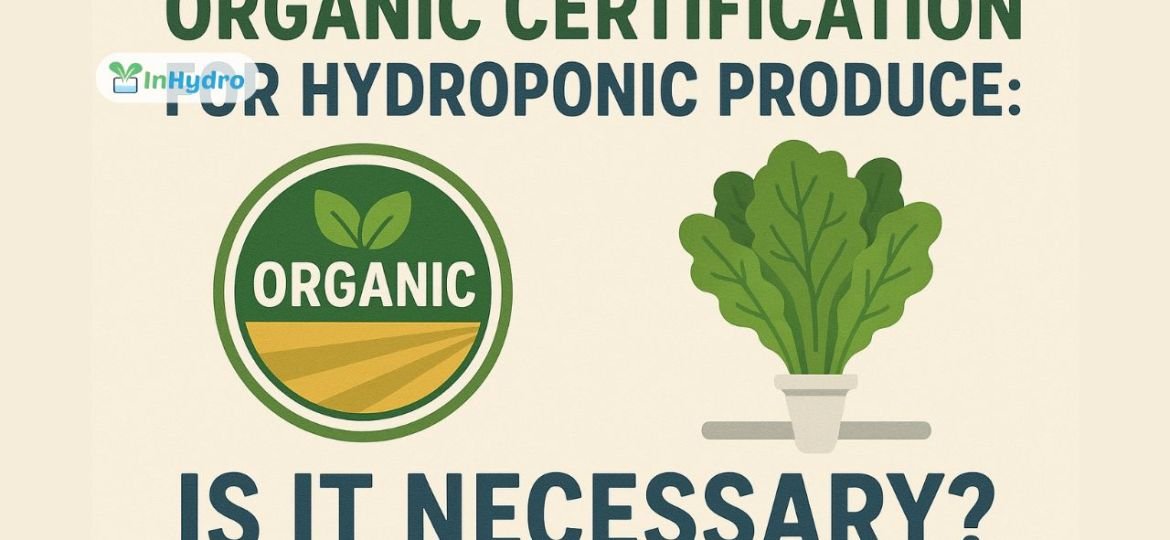
Organic Certification for Hydroponic Produce: Is It Necessary?
As hydroponic farming continues to gain traction in India, a pertinent question arises—does hydroponically grown produce require organic certification? While both practices aim to deliver safe, chemical-free food, they are not interchangeable in the regulatory sense. For hydroponic growers, understanding the relationship between organic labeling and soilless cultivation is critical for compliance, marketing, and consumer trust.
Understanding the Core Differences
The primary distinction between organic farming and hydroponics lies in the medium of cultivation. Organic farming is rooted in soil-based practices that emphasize natural inputs, crop rotation, composting, and biodiversity. Hydroponics, by contrast, eliminates soil altogether, delivering nutrients through water in a controlled system.
Despite being pesticide-free and residue-free, hydroponic produce does not meet the traditional definition of “organic” in many regulatory frameworks, as soil health is central to organic certification protocols.
Global Regulatory Landscape
Countries differ in their stance on organic certification for hydroponic systems:
- United States: The USDA currently permits organic labeling for hydroponic produce under the National Organic Program (NOP), though the decision has sparked debate within the organic farming community.
- European Union: The EU explicitly excludes hydroponically grown produce from organic certification, emphasizing soil-based ecological processes as a core principle.
- India: The Food Safety and Standards Authority of India (FSSAI) and APEDA do not currently recognize hydroponic cultivation under the scope of organic certification regulated by NPOP (National Programme for Organic Production).
This regulatory ambiguity leads to confusion among Indian consumers and retailers, many of whom associate the term “organic” with chemical-free, regardless of the cultivation method.
Certification Alternatives for Hydroponic Growers
While “organic” certification may not be legally applicable to hydroponic systems in India, growers can pursue other quality and safety certifications that reinforce the credibility of their practices:
- Residue-Free Certification: Confirms that the produce is free from harmful chemical residues, a key consumer concern.
- Good Agricultural Practices (GAP): Recognized globally, GAP certification verifies that crops are grown using safe, sustainable, and hygienic processes.
- ISO 22000 / FSSAI Compliance: Ensures food safety management throughout the supply chain.
- Controlled Environment Agriculture (CEA) Standards: While still emerging in India, these can be implemented as internal benchmarks for hydroponic farms.
InHydro supports partner farms in aligning with these standards, offering system designs and documentation that ease the path to certification.
Consumer Perception vs. Legal Definitions
The demand for organic produce is largely driven by concerns over pesticide exposure, food adulteration, and environmental degradation. Hydroponically grown vegetables meet many of these expectations—being free from harmful chemicals, grown in sterile conditions, and often more sustainable in terms of water and resource use.
However, labeling hydroponic produce as “organic” without certification can lead to regulatory penalties or consumer backlash if transparency is lacking. It is more appropriate and legally safe to use terms such as:
- Residue-free
- Grown without harmful chemicals
- Sustainably grown in controlled environments
These phrases clearly communicate value while remaining compliant with current guidelines.
The InHydro Position
InHydro recognizes that the debate around organic certification and hydroponics is evolving. Our approach is to focus on transparency, traceability, and compliance. Rather than chasing a label, we advocate for educating consumers on the actual benefits of hydroponically grown food:
- Precise nutrient management
- Zero pesticide usage
- Superior hygiene and shelf life
- Environmentally responsible water use
For our clients and partner farms, we assist in adopting best practices, conducting residue tests, and pursuing GAP or residue-free certifications as viable alternatives to organic status.
Conclusion
Organic certification may not currently apply to hydroponically grown crops under India’s existing regulations. However, this does not diminish their nutritional value, safety, or sustainability. In fact, hydroponic produce often exceeds organic benchmarks in terms of purity and control.
For hydroponic farms, the goal should be to build consumer confidence through quality assurance, clear communication, and third-party validations—regardless of the organic label.

